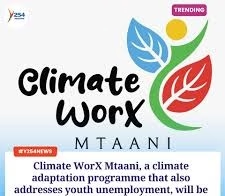
Youth Encouraged to Apply for Kazi Mtaani, Climate Workx Program.
Youth Encouraged to Apply for Kazi Mtaani, Climate Workx Program.
The government is inviting young people to apply for a six-month work program focused on climate initiatives, similar to Kazi Mtaani, which aims to recruit over 113,000 youths across the country for important environmental and infrastructure projects.
Kennedy Mwangome, the Deputy County Commissioner of Narok Central and chair of the Sub-County Technical Committee overseeing recruitment, urged local youths to submit their applications via the government portal crsp.go.ke.
Applications opened on June 5 and will be accepted for a period of 10 days.
“We encourage all eligible youths to apply. This is an opportunity to gain valuable work experience while contributing to environmental conservation and community development,” Mwangome stated.
Narok Central has one of the largest quotas in the county, with plans to recruit 267 casual workers and 9 supervisors, a decision influenced by the area’s significant number of informal settlements and vulnerable communities.
Rotich Charles, the County Director of Housing and Secretary of the Sub-County Technical Committee, explained that the program will focus on projects related to roads, housing, and environmental efforts.
“Youths involved in this initiative will participate in activities such as tree planting, river restoration, drainage expansion, cleaning market areas, and clearing roads,” Rotich noted.
He also mentioned that participants will receive orientation and training from officials from the State Department for Youth and the National Government Administrative Officers (NGAO).
In total, Narok County plans to engage over 1,075 youths in this six-month program, which is part of a national goal to involve 113,000 participants aged 18 to 35.
One youth per household will be chosen, with priority given to those from low-income backgrounds.
Although this program is temporary, the government aims for it to provide essential income and serve as a stepping stone toward long-term economic empowerment.
“This initiative is not just about earning wages; it’s about giving our young people purpose, structure, and a role in fostering climate resilience,” Mwangome concluded.
